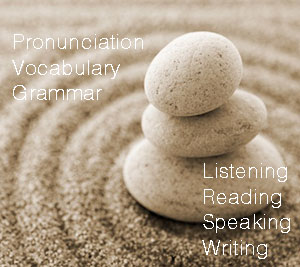 Browsing ESL forums and talking to prospective students, I noticed an interesting tendency – more and more Russian adults are deeply interested in training for IELTS. They wish to pass this international exam so that they could study abroad, emigrate to an English-speaking country or find a job with an international company.
Browsing ESL forums and talking to prospective students, I noticed an interesting tendency – more and more Russian adults are deeply interested in training for IELTS. They wish to pass this international exam so that they could study abroad, emigrate to an English-speaking country or find a job with an international company.
IELTS target band often depends on the goal. For instance, if you plan to emigrate to Australia by General Skilled Migration program, you will need 6.0-7.0 points of IELTS General exam, but if you are a spouse of a potential immigrant, you will need only 4.5 points. Universities usually require IELTS Academic exam, 6.5 or 7.0 points.
IELTS is not cheap. It costs about 9000 roubles (USD 300) in Moscow and Saint Petersburg. Even if you have a brilliant command of English, it is important to take time and prepare for the exam so that you do not waste your money. You should set realistic goals, considering the following issues: 1) your current level of English; 2) the amount of time you can spare for preparation; 3) your memory and 4) your target band.
IELTS courses are even more expensive. If you need a preparation course, a much better solution would be IELTS online that includes detailed preparation for all the four modules. As the course was compiled by professional IELTS teachers, it develops all the skills and strategies, boosts your confidence and helps to improve your IELTS score. Its main advantages are that it is online, easy to use and affordable. There are some time limitations (45 or 90 days), but it is a good stimulus to study every day.
It wouldn’t be realistic to set the goal of 7.0 IELTS target band in half a year if you have an elementary level of English. Besides, it would be irresponsible to rely totally on your teacher and to think that if you pay them, the language will magically embed in your head itself. In reality, the responsibility for your progress is shared 50/50 between your teacher and yourself. The teacher is to train your skills (listening, reading, writing, speaking) as efficiently as possible and to explain you IELTS strategies, while you are to be attentive during the classes, to do homework and to learn collocations at home.
What should you do, if your level of English is Beginner or Elementary?
First of all, you need to learn English and reach Intermediate level. The most efficient way is an intensive course with an experienced tutor. You will need to study the basics of English grammar, to memorise about two thousand collocations, to understand simple recordings of native speakers and to be able to discuss different topics in English.
You will not need profound knowledge of grammar, but it’s essential to use correctly Simple tenses, Passive voice, parts of speech, articles, modal verbs, all types of pronouns, prepositions and the most widespread phrasal verbs. You can use English Grammar in Use or Longman English Grammar Practice.
To develop your vocabulary, I would recommend you English Vocabulary Organiser and English Vocabulary in Use.
Provided you study seriously every day, do homework, learn vocabulary and have no problems memorising words or repeating the same mistakes, you will reach the Intermediate level in 6-12 months.
What should you do, if your level of English is Intermediate or higher?
You will need to do an IELTS practice test yourself and evaluate your score. It may be not so high for the first time since you haven’t yet developed exam skills.
You can find a teacher who is familiar with IELTS criteria and ask them to evaluate your Speaking and Writing. At this stage you will need a lot of IELTS practice tests: 1) Official IELTS Practice Materials, 2) Cambridge IELTS 3) Oxford IELTS. Study carefully the strategies for different modules, the structure of letters and essays. You can take advantage of Simone Braverman’s textbook Ace the IELTS for General exam or IELTS Target Band for Academic exam . In order to improve your writing skills, you can use Successful Writing Proficiency by Virginia Evans .
After you have studied tips and techniques, you will need to do as many tests as possible to develop your test-taking skills. Besides, you will need to study connectors and fillers for Speaking and Writing. You can improve your score, if you use a variety of connectors.
You can have the following study plan:
1) Do yourself at least one complete test per week (Listening, Reading, Writing), that is 2 hours 40 minutes. Try to use tips from Ace the IELTS, write all the answers on IELTS official answer sheets, this way you will get accustomed to exam format and will know the approximate length of your essay and letter/ graph analysis.
2) Analyse your mistakes with IELTS teacher each lesson, then revise them again at home. The more questions you ask your teacher, the better you will understand IELTS mechanics.
3) Work with IELTS vocabulary – write all the unknown collocations from IELTS practice tests and listening transcripts, learn at least 10-15 phrases per day. It would be wise to learn, at least 50 idioms, trying to use them during IELTS speaking.
4) Practice speaking every lesson, using IELTS format. Prepare your own maps of topics and people. E.g., my students usually compile special maps of a child they know, a teenager, a parent, a neighbour, a friend and an old person. The maps of people include their appearance, character and some idioms to describe every person.
5) Analyse your essays in detail. Make sure that you understand the meaning of “task response”, “coherence and cohesion”, “lexical resource” and “grammatical range and accuracy” as IELTS writing band descriptors. Arrange spelling dictations if you keep spelling certain words wrong.
6) Drill grammar exercises if you make some repetitive mistakes during speaking. You can ask your teacher to explain you grammar rules and to practice oral drills with you.
7) Focus on your weak skills. For instance, if you have difficulties with Listening, listen as much as possible. Add songs, BBC radio, movies, podcasts, audio books. Do more listening tests.
As a rule, if students do tests diligently, study IELTS collocations, analyse mistakes and practice a lot, their results will improve considerably after 8 practice tests. It will only be necessary to polish their skills so that they could pass the test under nervous strain during the real exam.
 Русский
Русский English
English



